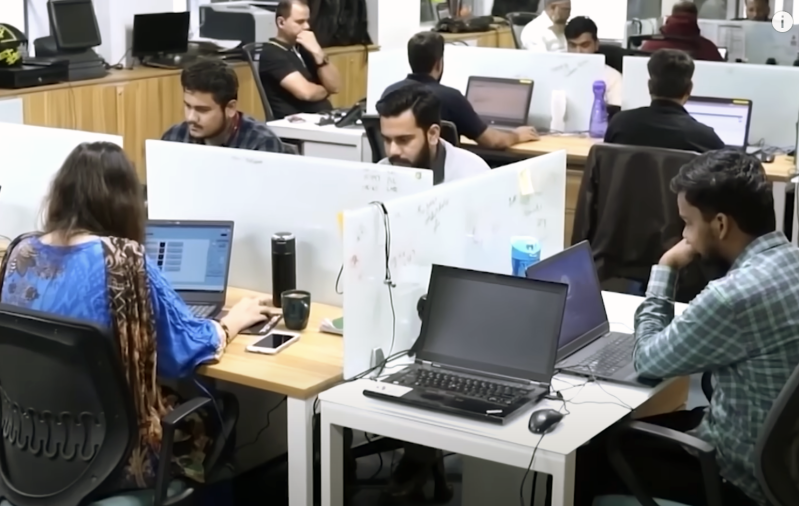
Shumayle Falak makes a living for his family by freelancing on online marketplaces but a nationwide internet slowdown due to the installation of a firewall by the government has rendered him and hundreds of thousands of other Pakistani youths jobless, exacerbating their financial woes in the inflation-hit economy.
“I was making between 2,000-2,500 US dollars [approximately 750,000 Pakistani Rupees] every month from freelancing as a graphic designer and content writer on Fiverr. Due to severe disruptions in the internet over the past months, I tried to access my Fiverr account through VPN [Virtual Private Network] but it was blocked and I can’t access anything now. This has caused me a huge financial loss as well as potential long-term clients,” said the 32-year-old Christian from Lahore.
Falak became a freelancer in 2020 as online marketplaces saw phenomenal growth across the world during the Covid pandemic. Before the pandemic, the Christian youth worked at a call center earning up to 100,000 Pakistani Rupees [1,190 USD] per month.
“Before freelancing, I was barely able to manage the expenses of my family but Fiverr was a gamechanger in my life. I worked very hard to build my online profile and was earning almost 7-8 times more than what I used to make four years ago. I’m back to scratch now thanks to our government’s poorly conceived policies,” he said.
The Pakistan government has for months denied that it is installing a firewall. While the government continued to insist that it was not responsible for the internet slowdown and blamed the telecom companies instead, the problem aggravated to a point that forced Pakistan’s minister for information technology and telecommunications to finally confirm on July 26 that the government was implementing an internet firewall, defending it as a cybersecurity upgrade.
Collatoral damage to Pakistan's economy
Falak and Sharon Paul, Christian freelancers from Karachi, believe they and thousands of other Pakistanis making a living from the internet were the most affected victims of the slowdown. There are at least 110 million internet users in Pakistan, almost half of the country’s total population.
“We are all facing different issues and many people in the freelancing community have lost their clients. We are not able to send files or download ones sent to us over WhatsApp and other applications," she told Christian Daily International.
Paul has a degree in computer sciences and opted for freelance work in 2022 to help her father and brother in running the household.
"I was making a good amount monthly as a freelancer but my income has suffered a serious blow in the past months. The government should have thought about the collateral damage it is inflicting on people like us who are fully reliant on foreign clients for our livelihood,” she said.
The 28-year-old computer scientist said that she didn’t feel safe working in an office environment in Pakistan amid rising crimes against women, especially those belonging to vulnerable communities such as Christians.
“I come from a very humble background and freelancing gave me the opportunity to earn good money from the safety of my home. I know several Christian girls and boys whose work has suffered immensely due to these internet disruptions,” she said, adding that most of them were breadwinners for their families.
A Christian freelancer in the garrison city of Rawalpindi, on condition of anonymity, said that the digital media company where he works suffered huge losses as they were unable to deliver the tasks on time, leading to clients pulling off their orders.
“Clients value the minutes we spend on posting media over socials or working on some product. Every update and the decided time matters. The work that we used to complete in 15-20 minutes was stretched to six to seven hours. All our clients who were waiting got upset with us,” he said.
Usama Khilji, director of Bolo Bhi, an advocacy forum for digital rights, said that freelance platforms like Fiverr were suspending Pakistani freelancers' accounts because of the internet disruptions.
“The IT industry, which was the only industry doing well in Pakistan's struggling economy, is also doing badly, not because of any other reason other than what the government is doing,” he said.
Khilji said the government’s decision would have bad consequences for the economy, adding that this would lead to a higher exodus of young talented and skilled workers as “working in Pakistan is becoming increasingly difficult”.
Pakistan Software House Association, which represents companies specializing in information technology, said in a statement that the internet disruptions could cause a loss of 300 million US dollars to Pakistan’s already weak economy. The association also accused the government of “hastily implementing a national firewall,” leading to slow connectivity and partial outages even on mobile data.
Response to 'digital terrorism'
Pakistan has allocated more than 70 million dollars for a Digital Infrastructure Development Initiative in the latest budget. Various reports have claimed that Pakistan has acquired an online censorship tool from China, which the government denies.
Critics and digital rights activists worry the nationwide firewall will be used to silence the growing public dissent against the country’s powerful military establishment and the incumbent political government.
The Pakistani military, which denies meddling in political affairs, has lately been using the term “digital terrorists” for online critics.
“Just as terrorists use weapons to get their demands met, digital terrorists use negative propaganda and fake news on social media platforms, mobiles and computers to create despondency to get their demands met,” Pakistani military spokesperson Lt. Gen. Ahmed Sharif Chaudhry said at a news conference on July 22.
Pakistan has already blocked access to X, formerly known as Twitter, since the February 8 general elections citing national security concerns with netizens having to access the popular microblogging website with the help of VPNs.





